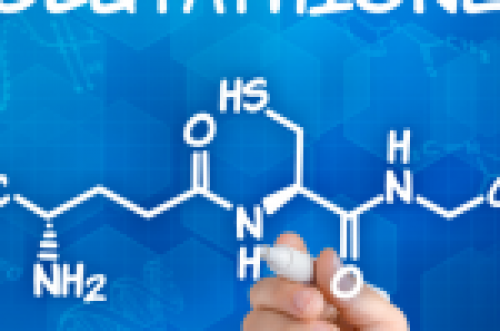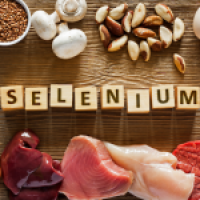Glutathione: The Master Antioxidant

If you haven’t heard of glutathione yet, you should. This little molecule is key to effective detoxification. Present in both Phase 1 and Phase 2 of the liver detoxification process, without it we would be in a world of hurt.
In the pursuit of wellness and longevity, there exists a molecule so pivotal, so fundamental to our health that it’s often overlooked, despite being indispensable. Glutathione – pronounced “gloota-thigh-own” – offers protection against various ailments from cancer to Alzheimer’s disease. Yet, despite its significance, many conventional medical professionals never think to check glutathione levels, account for its depletion, or suggest reducing toxin loads.
What is Glutathione?
Glutathione is not some obscure compound concocted in a laboratory; rather, it’s a simple molecule crafted by our bodies through the amalgamation of three amino acids – cysteine, glycine, and glutamine. But don’t be misled by its simplicity; glutathione wields immense power, primarily owing to its sulfur content, which acts as a magnet, attracting and neutralizing harmful toxins and free radicals lurking within our bodies.
Under normal circumstances, our bodies efficiently recycle glutathione, ensuring a steady supply to combat oxidative stress and toxins. However, in today’s world fraught with pollution, stress, and unhealthy lifestyles, this delicate balance is disrupted. Factors ranging from poor diet to environmental toxins deplete our glutathione levels, leaving us vulnerable to a plethora of diseases.
The Glutathione Deficiency Epidemic
In my practice, I’ve encountered a startling trend – nearly all severely ill people I work with exhibit glutathione deficiency. Conditions spanning from chronic fatigue syndrome to cancer often share a common denominator – compromised glutathione levels. The problem is not confined to the gravely ill; even seemingly healthy individuals may unknowingly harbor deficiencies, setting the stage for future health complications.
A Genetic Predicament
Compounding this issue is a genetic predisposition among a significant portion of the population. Evolutionarily, our ancestors thrived in a world devoid of the chemical onslaught we face today. Consequently, many lack the genetic blueprint necessary for robust glutathione production and recycling. This genetic deficit makes us susceptible to toxins our ancestors never encountered, paving the way for chronic illness.
The Role of Glutathione in Health and Disease
At its core, glutathione is the linchpin of our body’s defense mechanisms. Its multifaceted role spans from recycling other antioxidants to bolstering the immune system and facilitating detoxification processes. Without adequate glutathione, our cells are left defenseless against oxidative damage, paving the way for chronic diseases ranging from cancer to neurodegenerative conditions.
9 Tips to Optimize Glutathione Levels
Fortunately, bolstering glutathione levels is within reach thanks to lifestyle interventions and targeted supplementation. Here are nine tips to enhance your glutathione levels and safeguard your health:
1. Embrace sulfur-rich foods: Incorporate garlic, onions, and cruciferous vegetables like broccoli and kale into your diet to provide the building blocks necessary for glutathione synthesis.
2. Prioritize exercise: Regular physical activity combines aerobic exercises like walking or jogging with strength training to elevate glutathione levels and enhance overall health.
3. N-acetyl-cysteine (NAC): This supplement aids in replenishing cysteine levels, crucial for glutathione synthesis, and has shown promise in various clinical contexts, from asthma management to liver support.
4. Harness the power of alpha-lipoic acid (ALA): Known for its diverse benefits, alpha-lipoic acid complements glutathione in combating oxidative stress and supporting metabolic functions.
5. Optimize methylation: Ensure adequate intake of methylation nutrients like folate, vitamins B6, and B12, which are essential for the biochemical processes underpinning glutathione production.
6. Supplement with selenium: This trace mineral plays a pivotal role in glutathione metabolism, contributing to its synthesis and recycling within the body.
7. Embrace antioxidants: Vitamins C and E, alongside other antioxidants, synergize with glutathione, bolstering its efficacy and supporting overall cellular health.
8. Explore herbal remedies: Milk thistle, renowned for its hepatoprotective properties, can enhance glutathione levels, offering additional support for liver health.
9. Consider IV Glutathione therapy: While the most expensive option by far, glutathione IV supplementation is the fastest way to bring up your glutathione levels fast. It may be expensive, but it makes you feel great as soon as you are done. IV therapy isn’t practical for every-day supplementation, so try to do tips 1-8 the rest of the time.
The Health Benefits of Glutathione Supplementation
Glutathione supplementation holds promise in addressing a myriad of health concerns, thanks to its multifaceted properties:
- Immune support: Glutathione bolsters the immune system, defending against infections and supporting overall immune function.
- Detoxification: Vital for liver health, glutathione aids in detoxifying harmful substances, safeguarding against toxin-induced damage.
- Respiratory health: Glutathione plays a crucial role in maintaining lung function, offering relief to individuals with respiratory conditions like cystic fibrosis.
- Skin health: From reducing sun damage to combating signs of aging, glutathione promotes skin health, offering a natural path to radiant, youthful skin.
Navigating Supplementation: Safety and Considerations
While glutathione supplementation is generally well-tolerated, certain considerations warrant attention:
- Asthma risk: Inhalation of glutathione may trigger asthma symptoms in susceptible individuals, necessitating caution.
- Zinc interactions: Long-term supplementation may impact zinc levels, requiring monitoring in individuals at risk of zinc deficiency.
- Pregnancy and breast-feeding: Limited data exist on the safety of glutathione supplementation during pregnancy and lactation, highlighting the need for caution.
Glutathione is an important antioxidant for vitality and longevity, offering a potent defense against the ravages of modern living. By embracing lifestyle modifications and targeted supplementation, we can optimize our glutathione levels, fortify our bodies against disease and unlock the path to vibrant health. So, let us heed the call of this mighty molecule and embark on a journey toward wellness, armed with the power of glutathione.
References
-
Minich DM, Brown BI. A Review of Dietary (Phyto)Nutrients for Glutathione Support. Nutrients. 2019 Sep 3;11(9):2073. doi: 10.3390/nu11092073. PMID: 31484368; PMCID: PMC6770193. Link to article.
-
Kritsilis M, V Rizou S, Koutsoudaki PN, Evangelou K, Gorgoulis VG, Papadopoulos D. Ageing, Cellular Senescence and Neurodegenerative Disease. Int J Mol Sci. 2018 Sep 27;19(10):2937. doi: 10.3390/ijms19102937. PMID: 30261683; PMCID: PMC6213570. Link to article.
-
Watson, Ronald R., et al., editors. Nutrition and Functional Foods for Healthy Aging. Academic Press, 2017. Link to book. (amazon link)
-
Pall, Martin L., and Julius J. Levine. “Nutritional Supplements and the Treatment of Mitochondrial Dysfunction in Chronic Fatigue Syndrome and Fibromyalgia.” Neuro Endocrinology Letters, vol. 33, no. 2, 2012, pp. 123-126. Link to article.
-
Shih, Chun-Ching, et al. “Glutathione Level Regulation and Liver Protection by Traditional Chinese Medicine: Review and Future Perspectives.” Chinese Medicine, vol. 8, 2013, article 7. Link to article.

Further Reading on Supplements:
- How Magnesium Helps Your Body
- Ubiquinol / CoQ10 Benefits and Side Effects
- Health Benefits of Taurine
- Could Your Pain Be Caused by a Vitamin D Deficiency?
- B Vitamins: Essential Nutrients for Optimal Health
- Can B6 Cause Neuropathy?
- Sulforaphane, Mitochondria, and Oxidative Stress
- Functions of Lysine in the Body
- What are Adaptogens and How Do They Work?
- How Milk Thistle Supports Liver Health
- What Does L-Carnitine Do for the Body?
- Glutathione: The Master Antioxidant
- TUDCA for Liver and Gallbladder Health
- Health Benefits of Alpha Lipoic Acid (ALA)
- Benefits of Black Seed Oil
- Understanding Polyphenols: Nature’s Potent Health Allies



